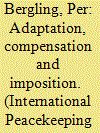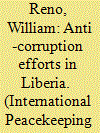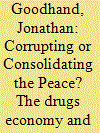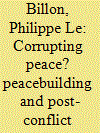|
|
|
Sort Order |
|
|
|
Items / Page
|
|
|
|
|
|
|
| Srl | Item |
| 1 |
ID:
082224


|
|
|
|
|
| Publication |
2008.
|
| Summary/Abstract |
Just as the international community was late in discovering the significance of the judiciary for the success of peacebuilding in Bosnia and Herzegovina, international agencies were also late in identifying corruption as a key reason why the Bosnian judicial agencies were not working. The steps taken eventually to address the situation, including introducing reformed judicial admission, discipline and dismissal regimes, were not strategic, but reactive in nature. Notably, the international community initially adhered to the idea that these reforms should be domestically 'owned' and 'led', and that the resulting laws should resonate well with pre-existing legal-cultural paradigms; but as this process did not produce the desired results, the Office of the High Representative and the Independent Judicial Commission chose gradually to increase their involvement, eventually assuming almost complete control over the process. The process culminated in the firing of almost the entire Bosnian judiciary and the imposition of an internationalized structure for judicial appointments and dismissals. Although this policy stood in stark contrast to the values of local ownership and local leadership, it has essentially produced positive long-term results.
|
|
|
|
|
|
|
|
|
|
|
|
|
|
|
|
| 2 |
ID:
082226


|
|
|
|
|
| Publication |
2008.
|
| Summary/Abstract |
International agencies intervene to promote reform in Liberia with promises to remake the country. Yet elections produce victories for former wartime commanders and officials accused of corruption. Many of these people continue to play important roles in the economy and command vocal followings. International organizations face a choice between a more radical intervention that amounts to a counterinsurgency operation to remove these people from their positions at the risk of creating political instability, and tacit acceptance of their power. Looking beyond these choices, is it possible that corrupt members of the elite and insiders can contribute to economic growth and political stability? Comparison of the organization of corruption in Liberia with models in East Asia indicates that political networks rooted in Liberia's economy may offer the promise of helping to integrate ex-combatants into the economic life of the country and address local demands for participation in politics.
|
|
|
|
|
|
|
|
|
|
|
|
|
|
|
|
| 3 |
ID:
082227


|
|
|
|
|
| Publication |
2008.
|
| Summary/Abstract |
This article examines how the drugs economy emerged, evolved and adapted to transformations in Afghanistan's political economy. With a primary focus on the conflictual war to peace transition following the signing of the Bonn Agreement, the relationship between drugs and political (dis)order is explored. Central to the analysis is an examination of the power relationships and institutions of extraction that developed around the drug economy. Expanding upon a model developed by Snyder (2004), it is argued that joint extraction regimes involving rulers and private actors have tended to bring political order whereas private extraction regimes have led to decentralized violence and political breakdown. This model helps explain why in some parts of Afghanistan drugs and corruption have contributed to a level of political order, whereas in other areas they have fuelled disorder. Thus, there is no universal, one-directional relationship between drugs, corruption and conflict. Peacebuilding involves complex bargaining processes between rulers and peripheral elites over power and resources and when successful leads to stable interdependencies. Counter-narcotics policies have the opposite effect and are thus fuelling conflict
|
|
|
|
|
|
|
|
|
|
|
|
|
|
|
|
| 4 |
ID:
082223


|
|
|
|
|
| Publication |
2008.
|
| Summary/Abstract |
Many conflict-affected countries are among the most corrupt in the world, and corruption is frequently reported as a major concern of local populations and foreign aid agencies during transition to peace. Tackling corruption is part of 'liberal peacebuilding', which seeks to consolidate peace through democracy and free markets economy. Yet liberalization policies may also foster corruption. Using a preliminary analysis of selected corruption perception indicators, this article finds tenuous and divergent support for post-conflict patterns of corruption. Three main arguments linking liberal peacebuilding with higher levels of corruption are then presented for further elaboration, and a research agenda is outlined
|
|
|
|
|
|
|
|
|
|
|
|
|
|
|
|
| 5 |
ID:
082222


|
|
|
|
|
| Publication |
2008.
|
| Summary/Abstract |
In countries emerging from civil war with weak governments, bribery demands will be used opportunistically by officials operating under unclear rules that allow them to invent offences or simply to extort funds from ordinary people. Furthermore, many people may engage in illegal activities, such as smuggling or illicit trade in arms, and may need the protection of public authorities to continue to operate. Peacebuilding strategies must avoid triggering vicious spirals. An economy that is jumpstarted by giving monopoly powers to a few prominent people may produce a society that is both lacking in competition and unequal. Although it may be risky and difficult to counter corruption in post-conflict peacebuilding, if the problem is allowed to fester, it can undermine other efforts to create a stable, well-functioning state with popular legitimacy. Care must be taken in starting down the road to reform. Strong leadership from the top is needed that moves towards the goal of a more legitimate and better functioning government and sidelines those who have in the past been using the state as a tool for private gain through threats and intimidation. International assistance can, in principle, help, but it needs to be tailored to avoid exacerbating the underlying problem created by the mixture of corruption and threats of violence from those inside and outside the government
|
|
|
|
|
|
|
|
|
|
|
|
|
|
|
|
| 6 |
ID:
082221


|
|
|
|
|
| Publication |
2008.
|
| Summary/Abstract |
The article argues that questions of definition relating to corruption are central to understanding its significance and its prominence in peacekeeping contexts. Definitional issues are discussed and a definition that combines certain universal features while acknowledging the importance of local norms and rules is offered. The definition revolves around actions, decisions and processes that subvert or distort the nature of public office and the political process. The challenge for peacebuilders is to develop and enforce standards for public office that have sufficient linkage with local norms and expectations to command some support, and to do so in a context that, by definition, lacks consensus on norms and principles of legitimacy for public office. The article explores some of the strategies open to those in post-conflict contexts and argues that corruption will frequently be a rational strategy for many, creating a vicious cycle that is hard to break. The article also questions how far corruption should be the major concern of peacekeeping forces, and how the concept might be disaggregated to allow a more targeted approach - one that recognizes that attacking corruption directly may not always be the best strategy, and that sees that corruption may not always be the major priority.
|
|
|
|
|
|
|
|
|
|
|
|
|
|
|
|
| 7 |
ID:
082225


|
|
|
|
|
| Publication |
2008.
|
| Summary/Abstract |
This article contends that the complex administrative mechanics prescribed in the Dayton Accords presented opportunities for nationalist leaders to abuse public office. At the same time, economic reforms and a high degree of decentralization gave elites and local communities the facility to resist externally induced structural adjustment. The economic paradigm introduced for transition limited any attempt to establish a social contract between individual and the state. Consequently, a degree of social cohesion remains through adherence to local, clientelistic loyalties and informal economic activity. This provides the cultural and structural economic context in which the abuse of public office flourishes
|
|
|
|
|
|
|
|
|
|
|
|
|
|
|
|
| 8 |
ID:
082228


|
|
|
|
|
| Publication |
2008.
|
| Summary/Abstract |
Indexes of corruption compiled by the World Bank and Transparency International suggest that Iraq is one of the world's most corrupt countries. While corruption thrived under Saddam Hussein, it has worsened further in the post-Saddam era. Controlling and eradicating Iraqi corruption has proved difficult owing to the fact that it is the product of an interrelated set of forces including: (a) the growth and dynamics of the shadow or informal economy; (b) the deterioration in social capital, and in particular the near absence of trust between the different regions, religious groups, tribes and even within local neighbourhoods; and (c) the evolving relationship between tribes, gangs and the insurgency. Any effort that attempts to control corruption without taking these factors into account will have little chance of success.
|
|
|
|
|
|
|
|
|
|
|
|
|
|
|
|
|
|
|
|
|